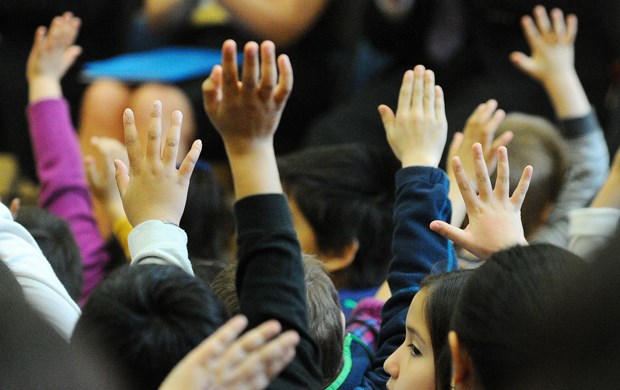For most students, the coming week is report card time in local school districts. Traditionally, that’s been when Mom and Dad found out how many As and how many Cs their kids were getting in social studies and whether little Johnny had scored 55 or 80 per cent in math.
But the way students are being assessed by their teachers is changing.
In many schools, teachers are moving away from an emphasis on letter grades and percentages as a way to track student progress.
The changes are part of provincial change in direction under the new curriculum that stresses core skills like critical thinking.
Along with that change, parents of a number of students in both elementary and high school classes on the North Shore won’t be getting a traditional report card. Instead, they may be told whether their kids can work independently or not, in areas like “social skills” and “community” as well as more familiar reading and math.
In some cases, report cards aren’t even called report cards anymore.
The new approach doesn’t mean parents won’t know how their kids are doing in school, say administrators working on the program, but how that’s communicated may look different.
Under existing rules set by the ministry of education, letter grades are mandatory in grades 6 to 12 and optional in grades 4 and 5. Teachers must also provide percentages in courses at the grade 11 and 12 level.
Younger students in the primary grades don’t get letter grades but are assessed in terms of whether they meet expectations for their grade level.
But pilot projects now underway on the North Shore are taking another look at much of that, in collaboration with the province.
Last year, kindergarten students in West Vancouver got their report cards in a new format, based on the new curriculum – with an emphasis on “core competencies.” Parents were given a chance to provide feedback, and most were very positive, said Lynne Tomlinson, an administrator in the West Vancouver School District who has been working on the new ways of reporting to parents.
This year, there are more pilot programs underway at the grades 1, 2 and 4 level in West Vancouver.
As part of that pilot, West Vancouver Grade 4 students won’t get letter grades but will receive a report card in a new format, developed by local teachers. Most parents who’ve come to meetings about the changes are “very enthusiastic that we’re moving away from grades,” said Tomlinson. “They like the fact that it’s more personalized.” Parents will also get a chance to weigh in after the fact on a survey in the spring.
In the North Vancouver School District, changes to report cards have been taken a step further at Carson Graham secondary school.
A provincial pilot program running at Carson – an International Baccalaureate school – has ditched traditional report cards and letter grades for students in grades 8 through 10, in favour of a more complicated IB-endorsed structure, which assesses students’ progress on a scale of one to eight. (Similar pilots at Queen Mary and Capilano elementary IB schools in North Vancouver assess students on a four-point scale.)
For parents who grew up knowing what a C+ versus an A translates to, the new report cards that put the IB-style reporting into a formal structure can take some getting used to, said Kathleen Barter, district vice-president of learning services for North Vancouver School District.
“We have an educated sense of what (letter grades) mean,” said Barter. But in reality “it doesn’t give that much information.”
Some parents are curious about the changes, while others are concerned, said Barter. But many of those concerns are addressed when they find out more about how the new assessments work, she added. “I think the biggest fear parents have is the unfamiliar.”
Greg Tweed, vice-chair of Carson Graham’s parent advisory council, acknowledges the new report cards are more complicated than letter grades. “It’s not necessarily the easiest thing to understand,” he said – for either parents or students. But Tweed said he thinks it’s worth putting in the effort. “It’s a better indicator of overall children’s accomplishment in school and where they can improve,” he said. “I see the value in it. There are multiple ways to assess somebody.”
So far there are no changes planned for the grade 11 and 12 graduation program report cards.



